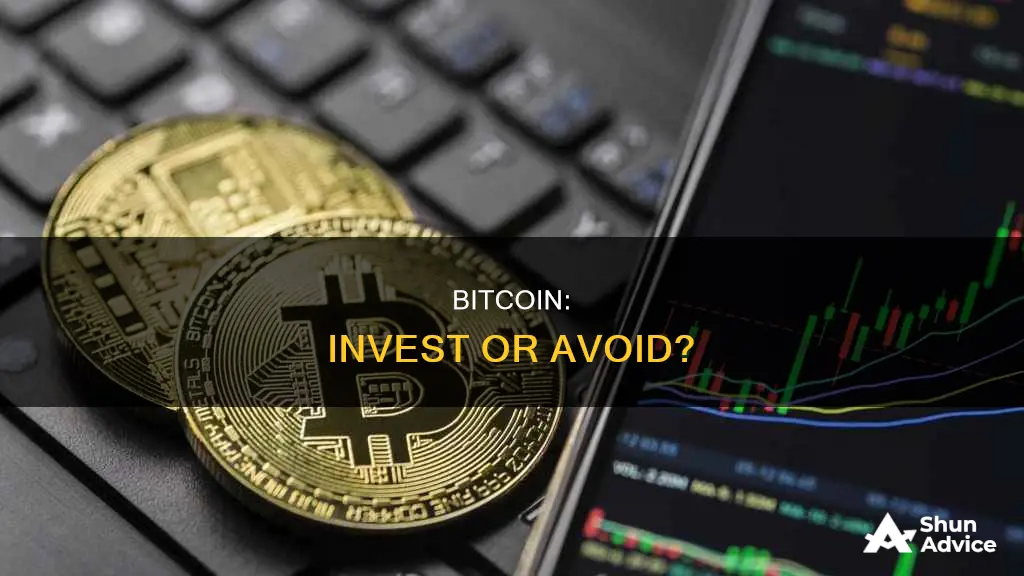
Bitcoin is a popular type of cryptocurrency that utilizes a large chain of interconnected computers to store and protect your digital assets. It is a highly volatile asset that's prone to large and fast swings in value, which presents an opportunity for large returns but also poses tremendous risk.
If you're thinking about investing in Bitcoin, it's important to conduct thorough research and understand how it works. Here are some key things to know:
- Bitcoin is a digital currency that operates outside the regulation of any individual company or government. It is overseen by an online, decentralized network of users and guarded by encryption through blockchain technology.
- You can use Bitcoin to buy things online, but your options of merchants that accept crypto are more limited than those who accept traditional currencies.
- Bitcoin is often referred to as a digital coin or token, and transactions are processed and recorded by a group of computers using blockchain software.
- The value of Bitcoin has experienced a substantial surge over the past decade, with a single Bitcoin costing around $60,000 as of May 2024.
- Investing in Bitcoin can be risky due to its volatile nature and lack of regulation. There is also the risk of scams and fraud in the crypto space.
- It's important to understand your risk tolerance and investment goals before investing in Bitcoin. Diversifying your portfolio and starting with small investments can help mitigate the risk.
- There are different ways to invest in Bitcoin, such as through brokers, cryptocurrency exchanges, or even crypto ATMs.
- To invest, you'll need a cryptocurrency exchange account, personal identification documents, a secure internet connection, and a method of payment.
- It's crucial to prioritize the safe storage of your Bitcoin, such as using hot wallets (online) or cold wallets (offline).
| Characteristics | Values |
|---|---|
| Volatility | Very high |
| Risk | High |
| Accessibility | High |
| Potential returns | High |
| Investment options | Direct and indirect |
| Investment amount | $25 minimum |
| Storage options | Hot and cold wallets |
What You'll Learn

How to buy Bitcoin
- Choose a Crypto-Trading Service or Venue: Select a cryptocurrency exchange that offers the features and cryptocurrencies you desire. Popular exchanges in the U.S. include Coinbase, Kraken, Gemini, and Binance. When creating an account, ensure you use two-factor authentication and a strong, unique password.
- Connect Your Exchange to a Payment Option: Link your bank account, debit card, or credit card to your chosen exchange. Be aware that using a credit card may result in additional processing fees and interest charges.
- Place an Order: Decide how much Bitcoin you want to buy. You can purchase fractions of a single coin, with some exchanges allowing investments as low as $25 or $30.
- Safe Storage: Transfer your purchased Bitcoin to a secure digital wallet. You can choose between a hot wallet, which is connected to the internet, or a cold wallet, which is an offline hardware device. Examples of hot wallets include Electrum and Mycelium, while cold wallets include Ledger Nano S and Trezor Model T.
Remember to always do your research, understand the risks involved, and make sure you comply with any legal, regulatory, and tax requirements in your jurisdiction.
Gold Coins vs. Gold: Which is the Better Investment?
You may want to see also

Bitcoin wallets
There are two types of Bitcoin wallets: hot wallets and cold wallets.
Hot Wallets
Hot wallets, or online wallets, are apps on devices such as computers, phones, or tablets. These wallets generate the private keys to your coins on internet-connected devices.
Hot wallet providers include Electrum and Mycelium.
The user of a hot wallet isn't the holder of the private key to the cryptocurrency that is held in it. Exchange wallets are custodial accounts provided by the exchange. If the exchange is hacked, investor funds are compromised.
Hot wallets are best for small amounts of cryptocurrency or cryptocurrency that is actively trading on an exchange and may be used like a checking account.
Cold Wallets
A cold wallet isn't connected to the internet and is at less risk of being compromised. These offline wallets or hardware wallets store a user's private key on something that isn't connected to the internet and come with software that allows investors to view their portfolio without putting their private key at risk.
A paper wallet is a wallet generated at certain websites that produces both public and private keys printed on paper. Many people laminate these paper wallets and store them in safe deposit boxes at their bank or even in a safe in their home.
A hardware wallet is typically a USB-drive device that stores a user's private keys securely offline. Such wallets have advantages over hot wallets because they are unaffected by viruses that could infect one's computer. With hardware wallets, private keys never come into contact with a network-connected computer or potentially vulnerable software.
Cold wallets are the most secure way to store your bitcoin or other cryptocurrencies. They do require technical knowledge to set up, though.
When creating accounts for your digital wallets, use a strong password and two-factor authentication.
Bitcoin: Buy, Invest, or Both?
You may want to see also

Risks of investing in Bitcoin
Bitcoin is a highly volatile asset prone to large and fast swings in value, which presents an opportunity for large returns but also poses tremendous risk. Here are some of the key risks of investing in Bitcoin:
Volatile and Fluctuating Market
The price of Bitcoin is constantly changing, and there is no way to predict if you will get a return on your investment. The market is unpredictable, and the value of Bitcoin can rise or fall dramatically in a short period. Making small investments is a more beneficial long-term strategy.
Cyberattacks and Hacking
Bitcoin is technology-based, and this leaves it open to cyberattacks and hacking. There is no way to retrieve lost or stolen Bitcoins, and many buyers lose their investments on exchanges and mining losses. Even if you have the protection of a smart wallet, exchanges are more likely to be hacked. Additionally, if you forget or misplace your key, you may not be able to retrieve your coins.
Fraud
In addition to hacking, fraud is also prevalent in the Bitcoin market. As buyers and sellers look to trade Bitcoins online, some exchanges can be fake, duping unsuspecting investors out of their Bitcoins. This lack of security creates a significant risk for investors.
Little or No Regulation
Currently, the Bitcoin market operates with little to no major regulations. The government doesn't have a clear stance on cryptocurrency, and it is not taxed, which can be enticing for investors. However, the lack of taxation could lead to problems if Bitcoin competes with government currency. There is no telling what the state of the Bitcoin market will be in a few years.
Technology Reliance
Bitcoin is entirely reliant on technology. It is an online exchange where coins are digitally mined and exchanged via smart wallet. Without the technology, Bitcoin is worthless. This also makes Bitcoin owners more vulnerable to cyber threats and online fraud.
Block Withholding
New Bitcoins are created by solving mathematical equations called "blocks," but a mining pool can use computational power to mine a block and hide it from honest miners. This allows a select few to benefit while leaving others with nothing.
Ponzi Scheme
Bitcoin has been referred to as a Ponzi scheme, where people at the top benefit from the ignorance of others. As more people buy into Bitcoin, it creates a bubble economy that can burst at any moment, leaving many people holding onto cryptocurrency that has become useless.
Lack of Acceptance
Bitcoin may be a step towards a new monetary exchange, but only a few companies accept it as a viable form of currency. Currently, a handful of online stores and travel companies allow cryptocurrency exchanges, and many companies do not recognize Bitcoin as a legitimate exchange.
Legal and Tax Implications
The legal standing of cryptocurrency is unclear due to its newness. The wise investor should consider reporting their holdings as foreign assets, but the requirements are uncertain. Additionally, profits from cryptocurrency trading are taxable as capital gains in some countries, and the way that government tax authorities view cryptocurrency holdings is evolving.
Bitcoin: Should You Invest in the Crypto Craze?
You may want to see also

How to store Bitcoin
There are several ways to store Bitcoin, each with its own pros and cons. Here are some of the most common methods:
Cold Wallets
Cold wallets are offline crypto wallets that are considered one of the safest options for storing Bitcoin. They are not connected to the internet, making them highly secure against hacks and theft. There are two main types of cold wallets:
- Hardware Wallets: These are small, physical devices that connect to your computer and store your cryptocurrency. Examples include Ledger, Trezor, and Coldcard. They are typically purchased directly from the manufacturer and can cost around $50 to $150.
- Paper Wallets: Paper wallets are physical documents that contain your public address for receiving Bitcoin and a private key that allows you to spend or transfer Bitcoin. You can generate a paper wallet for free using online services, and then print out the credentials. However, paper wallets are vulnerable to physical damage, theft, and wear and tear.
Hot Wallets
Hot wallets are online crypto wallets that are connected to the internet. They are more convenient and accessible than cold wallets but are also more susceptible to hacks and theft. Examples include:
- Mobile Wallets: These are applications that you can download on your smartphone, such as the BitPay Wallet. They are quick and easy to use, making them ideal for sending or paying with crypto. However, they may be less secure than cold wallets and are not recommended for storing large amounts of Bitcoin.
- Web Wallets: Web wallets are hosted by a web service and controlled by a third party. They are convenient and easily accessible from any device connected to the internet. However, they are vulnerable to hacks and security breaches. Examples include exchange wallets like Coinbase, Binance, and Kraken.
- Desktop Wallets: These are downloaded and installed on your computer, storing your private keys on your hard drive. They are more secure than web wallets but are still connected to the internet, making them inherently less secure than cold wallets.
Custodial Wallets
Custodial wallets are managed by a third party, such as an exchange, who stores your private keys for you. They offer convenience and ease of use, especially if you want to trade crypto frequently. However, they give you less control over your crypto and are vulnerable to hacks and security breaches.
Non-Custodial Wallets
Non-custodial wallets give you full ownership and control of your private keys. They can be either hot or cold wallets. Examples include hardware wallets and paper wallets.
When choosing a Bitcoin wallet, it's important to consider your individual needs, the level of security provided, and the convenience of accessing your crypto. It's generally recommended to use a combination of hot and cold wallets or multiple wallets for different purposes. Additionally, always back up your wallet and keep your recovery seed or phrase in a safe place.
RV Investment: A Safe Haven from Bitcoin's Volatility
You may want to see also

Bitcoin vs other investments
Bitcoin is a popular type of cryptocurrency that utilizes a large chain of interconnected computers to store and protect your digital assets. It is a highly volatile asset that's prone to large and fast swings in value, which presents an opportunity for large returns but also poses a tremendous risk.
Risk
Bitcoin is a relatively new development and isn't yet widely adopted. This adds a layer of risk because it could be replaced by other more efficient digital currencies, or it could be regulated out of existence.
In contrast, stocks are more established and have a longer track record. There is more guidance available to understand where the price of a stock might go, and there is an expectation that the stock market will be supported by governments and central banks.
Volatility
Bitcoin has been more volatile than stocks. There is the potential for dramatic growth with Bitcoin, but also for dramatic loss. Its value is prone to massive spikes and drops in price.
Regulation
Bitcoin does not undergo the same regulatory scrutiny as regulated securities markets like the stock exchange. This lack of regulation creates a level of uncertainty and risk for investors.
Diversification
Bitcoin can be a good way to add diversity to your portfolio, especially if you want to hold some assets that aren't denominated in a traditional currency. However, due to the risks outlined above, it's generally recommended that Bitcoin should not be the main focus of your investment strategy.
Tax Efficiency
From a tax perspective, Bitcoin has a significant edge over stocks. It is treated as "property" by the IRS, which means it is not subject to the wash sale rule. This allows investors to harvest tax losses more frequently and aggressively, leading to higher savings that can be reinvested in their portfolio.
The Future of Bitcoin: Exploring New Investment Opportunities
You may want to see also







